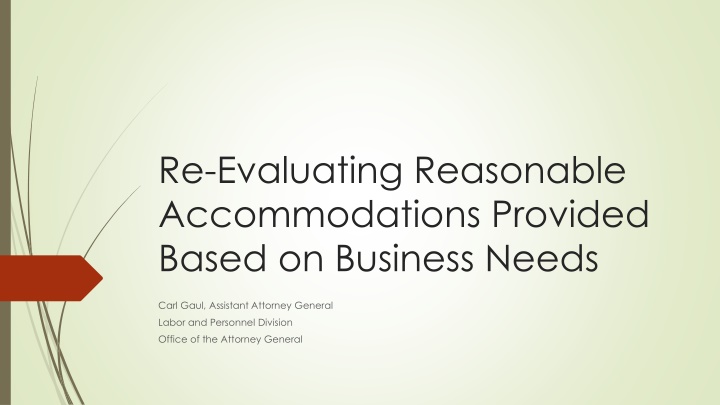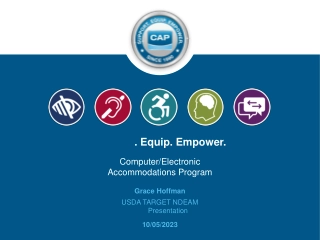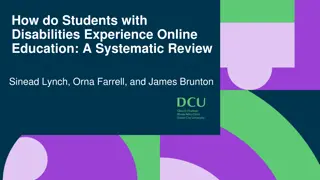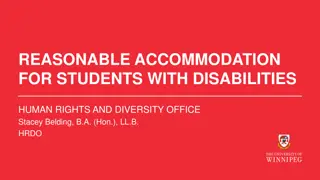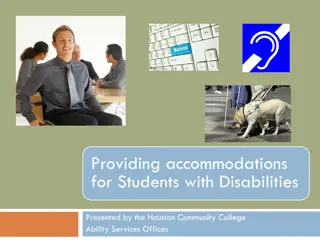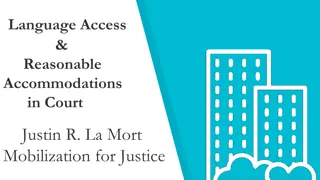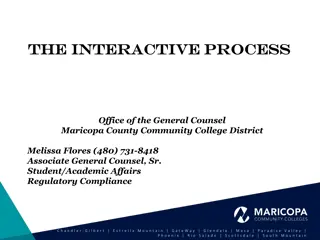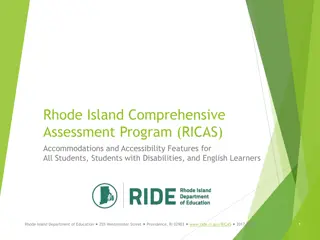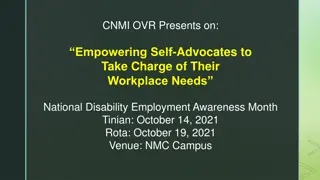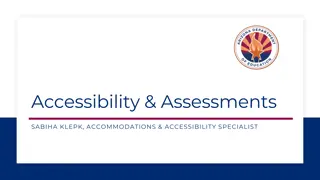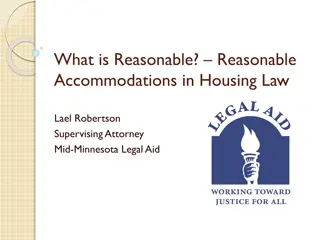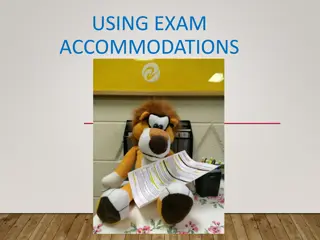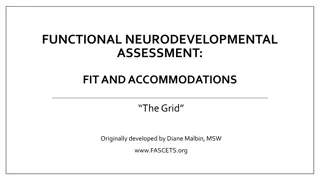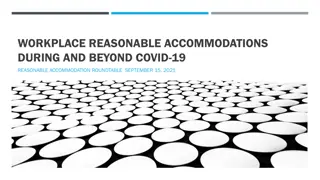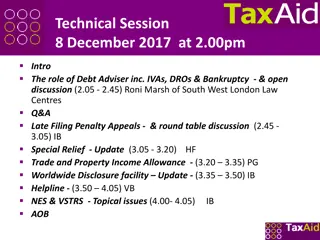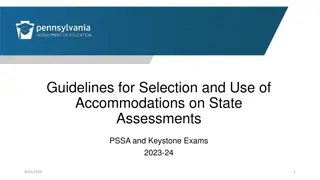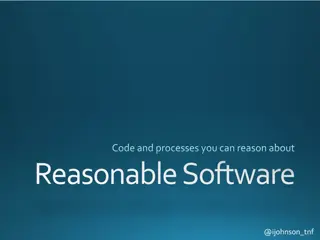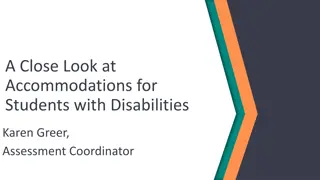Re-Evaluating Reasonable Accommodations Based on Business Needs
Providing reasonable accommodations to employees based on business needs is essential for a productive work environment. It is crucial to review existing accommodations periodically and make changes if necessary. Understand the concept of undue hardship defense and factors to consider in such cases to ensure compliance. Learn more about essential functions and the importance of balancing business requirements with employee needs
Download Presentation

Please find below an Image/Link to download the presentation.
The content on the website is provided AS IS for your information and personal use only. It may not be sold, licensed, or shared on other websites without obtaining consent from the author.If you encounter any issues during the download, it is possible that the publisher has removed the file from their server.
You are allowed to download the files provided on this website for personal or commercial use, subject to the condition that they are used lawfully. All files are the property of their respective owners.
The content on the website is provided AS IS for your information and personal use only. It may not be sold, licensed, or shared on other websites without obtaining consent from the author.
E N D
Presentation Transcript
Re-Evaluating Reasonable Accommodations Provided Based on Business Needs Carl Gaul, Assistant Attorney General Labor and Personnel Division Office of the Attorney General
Reasonable Accommodation Already In Place Review After 60 days, or other reasonable time period If an employee communicates a need for change, re-engage Employee may need a different or additional accommodation Can be appropriate to ask for more medical documentation You/program discover that the RA is not meeting business needs Another RA process Undue Hardship Defense Direct Threat
As Always: Essential Functions Essential functions are the basic jobs duties that an employee must be able to perform, with or without a reasonable accommodation. Functions and tasks. WHAT NOTHOW
Undue Hardship Meaning Employers should always keep in mind that they do not have to provide an accommodation that causes an undue hardship. "Undue hardship" means significant difficulty or expense in providing the accommodation. This analysis focuses on the particular employer's resources, and on whether the accommodation is unduly extensive, substantial, or disruptive, or would fundamentally alter the nature or operation of the business. 42 U.S.C. 12111(10); 29 C.F.R. 1630.2(p).
UNDUE HARDSHIP DEFENSE 5 Undue hardship is defined as something that is unduly costly or extensive or disruptive or fundamentally alters the nature or operation of the agency. Employer need only establish the undue hardship if it makes no reasonable accommodation or does not continue to accommodate Undue hardship is the defense of last resort and has a very high threshold. This defense is rarely successful.
UNDUE HARDSHIP DEFENSE - FACTORS 6 Roetter v. Michigan Dept. of Corrections, 2012 US App LEXIs 1343 (6th Cir. 2012) (unpublished) Factors considered: o Nature and cost of the accommodation o Overall financial resources of the facility o Size of the employer s business, number of employees, effect on expenses o Type of operation, impact on operations o Impact of the accommodation on operations
DIRECT THREAT DEFENSE 7 [D]irect threat means a significant risk of substantial harm to the health or safety of the individual or others that cannot be eliminated or reduced by reasonable accommodation. . . . 29 C.F.R. 1630.2. Employer has burden to prove that direct threat exists and cannot be accommodated. May require medical examination.
Employee must show That a proposed accommodation would enable them to perform the essential functions of their job And at least on the face of things, it is feasible for the employer under the circumstances. The employer can then defend by showing that the proposed accommodation is not as feasible as it appears but rather that there are further costs to be considered Courts have found that the difficulty of providing [the employee s] proposed accommodation will often be relevant both to the reasonableness of the accommodation and to whether it imposes an undue hardship.
When you re-evaluate Supervisor feedback Performance Essential Functions Co-workers Deliverables Is it working for the employee? This will vary broadly across different accommodations
Additional RA Process Just because an employee has one accommodation does not mean they do not need another Necessary Effective Impose undue hardship
Reasons an Accommodation Might Be an Undue Hardship Adverse Effect on Other Employees their essential functions OR the modification significantly disrupts the operations of the employer Modifying Schedules might overburden other employees; adversely affect other employees ability to perform Leave of Absence might have other employees working longer hours Reassignment when the search goes on so long that it becomes an undue hardship Too Expensive Courts are not receptive to this reason Costs spent for accommodation depends on employer s resources not employee s salary Changes in training, excessive overtime Collective Bargaining Agreement (CBA) example, in Kempter v. Michigan Bell Telephone Co., 2013 U.S. App. LEXIS 17930 (6th Cir. 2013)(unpublished), the court held that the ADA did not require that the plaintiff be given a particular job as a reassignment where this would violate another employee s collective bargaining rights Courts have held that a conflicting collective bargaining agreement can be used to show undue hardship. For
Case Example 1: Always Make the Effort Perkins v. Bd. of Trustees of Univ. of Illinois, No. 95 C 4320, 1996 WL 374126, at *4 (N.D. Ill. June 27, 1996) Plaintiff employee was allergic to dust, which resulted in serious adverse health consequences Requested a reasonable accommodation detailing his restrictions Plaintiff then made no further effort and did not respond to inquiries from HR Defense verdict.
Case Example 2 Torres v. Children's Hosp. & Health Sys., Inc., 2020 WL 7029483, at *8 (E.D. Wis. Nov. 30, 2020) EE with mental health related disability Position: medical assistant Associated medications contributed to frequent absences and tardiness RA Process Requested and received later scheduled start times Also received permission to take intermittent leave Permitted to be tardy or absent for up to eight shifts each month Required to provide notice at least one hour in advance Gave supervisor opportunity to reassign responsibilities
Case Example 2 Torres v. Children's Hosp. & Health Sys., Inc., 2020 WL 7029483, at *8 (E.D. Wis. Nov. 30, 2020) Accommodation proved difficult for supervisor Allowed EE to miss 75% of her 12-13 shifts per month EE consistently failed to provide 1 hour s notice of tardiness or absence Plaintiff asked for additional accommodation: excused from reporting tardiness/absence in advance Due to the administrative difficulty, ER decided it would re-evaluate the reasonableness of the accommodation Then, the EE qualified for FMLA and received approval for intermittent leave, regardless of accommodation status Re-evaluation delayed until after FMLA expired
Case Example 2 Torres v. Children's Hosp. & Health Sys., Inc., 2020 WL 7029483, at *8 (E.D. Wis. Nov. 30, 2020) Court turned to the essential functions Reliable attendance was an essential function of the position Thus, it appears that the plaintiff would have needed enough sporadic leave to cover at least one-third of her shifts each month. And because there is no indication that the plaintiff's mental condition is temporary, her need for this leave would likely have continued for as long as she held the job. The frequent, sporadic, and unpredictable leave that the plaintiff sought as an accommodation would not have enabled her to perform these essential functions. Instead, such leave would have excusedher from performing them.
Case Example 2 Torres v. Children's Hosp. & Health Sys., Inc., 2020 WL 7029483, at *8 (E.D. Wis. Nov. 30, 2020) Although Children's actually accommodated the plaintiff by tolerating her frequent and unpredictable absences for nearly a year, it does not follow that the ADA requiredChildren's to make or continue to make this accommodation. [I]f an employer bends over backwards to accommodate a disabled worker goes further than the law requires by [making an accommodation], it must not be punished for its generosity by being deemed to have conceded the reasonableness of so far-reaching an accommodation.
